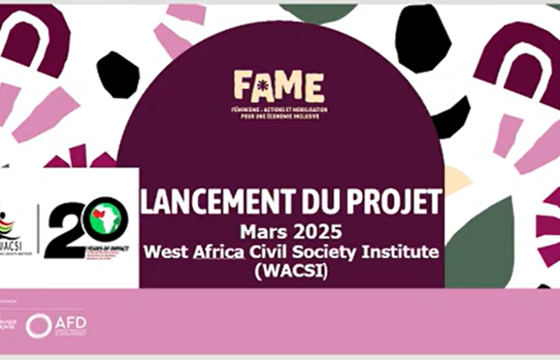[West Africa, 11 March 2025] – “Women are not merely beneficiaries of economic policies; they are actors, builders, and custodians of our local economies. It is time they are recognised as such.”
With these powerful words, Omolara Balogun, Head, Policy Influencing and Advocacy at the West Africa Civil Society Institute (WACSI), officially opened the virtual launch of the Feminism, Action and Mobilisation for an Inclusive Economy (FAME) project on 11 March 2025.
This marks a transformative moment for women’s economic rights in West Africa and Africa as a whole.
The event brought together over seventy-five (75) participants, including feminist leaders, community-based organisations, civil society actors, and development partners, all united by a shared commitment to confronting systemic exclusion and economic marginalisation faced by women across the region.
Supported by the French Development Agency (AFD), the four-year FAME project will be implemented in ten countries — Morocco, Benin, Togo, Guinea, Sri Lanka, Pakistan, Bangladesh, Ecuador, Bolivia, Dominican Republic— with a focus on empowering grassroots women’s organisations and feminist movements.
“This programme is a political response to decades of systemic marginalisation,” Balogun explained.
“African women are not waiting to be empowered—they are already leading. What they need is solidarity, resources, and the space to thrive,” she added.
Her remarks underscored the urgency of recognising women not as passive beneficiaries but as central drivers of economic transformation.
The project is founded on a feminist and transformative vision that aims to dismantle persistent barriers such as unpaid care work, limited access to land, finance, and markets, and patriarchal norms that restrict women’s agency.
It strives to strengthen women’s capacity and leadership, amplify their voices, and advocate for gender-responsive and inclusive economic policies that reflect their lived realities.
Alnoudjim Tograbaye, Programme Assistant at WACSI, stressed, “We want women not just to be visible in the economy, but powerful. And that begins with direct support to their organisations, their narratives, and their everyday struggles against systemic injustice.”
FAME is designed around four key pillars: providing direct and flexible funding to feminist and women’s rights organisations; creating spaces for feminist care, reflection, and solidarity; amplifying African feminist knowledge and documentation; and building collective voice through strategic regional advocacy.
This multi-sectoral and intersectional approach reflects a deep commitment to co-creation and grassroots ownership.
Fatoumata Kombadouno, FAME Project Officer at WACSI, emphasised this principle, stating,
“This project only makes sense if it is co-created with those who live injustice every day. It is not here to impose a model — it is here to support, to listen, and to amplify what already exists and has long been ignored,” she said.
FAME’s focus extends to those often marginalised within movements themselves, including rural women, women with disabilities, LGBTQIA+ persons, migrant women, and informal workers.
Voices from across West Africa resonated throughout the launch event, reflecting the passion and determination of women activists.
The project is led by a consortium comprising CARE France, CONLACTRAHO, and the South Asia Women Development Forum (SAWDF), with Geres as the lead partner, FAME combines advocacy, capacity building, community mobilisation, and direct funding to drive sustainable and systemic change.





